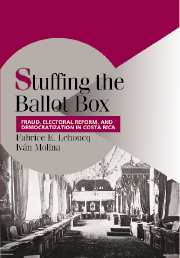Book contents
- Frontmatter
- Contents
- List of Tables and Figures
- Preface
- INTRODUCTION
- 1 ELECTORAL FRAUD DURING INDIRECT AND PUBLIC ELECTIONS, 1901–12
- 2 INSTITUTIONAL CHANGE, ELECTORAL CYCLES, AND PARTISANSHIP, 1910–4
- 3 ELECTORAL FRAUD DURING THE PUBLIC BALLOT,1913–23
- 4 INSTITUTIONAL CHANGE, ELECTORAL CYCLES, AND PARTISANSHIP, 1924–8
- 5 ELECTORAL FRAUD DURING THE SECRET BALLOT, 1925–48
- 6 POLITICAL POLARIZATION, ELECTORAL REFORM, AND CIVIL WAR, 1946–9
- CONCLUSION: BALLOT-RIGGING AND ELECTORAL REFORM IN COMPARATIVE PERSPECTIVE
- Index
- Cambridge Cultural Social Studies
Preface
Published online by Cambridge University Press: 16 July 2009
- Frontmatter
- Contents
- List of Tables and Figures
- Preface
- INTRODUCTION
- 1 ELECTORAL FRAUD DURING INDIRECT AND PUBLIC ELECTIONS, 1901–12
- 2 INSTITUTIONAL CHANGE, ELECTORAL CYCLES, AND PARTISANSHIP, 1910–4
- 3 ELECTORAL FRAUD DURING THE PUBLIC BALLOT,1913–23
- 4 INSTITUTIONAL CHANGE, ELECTORAL CYCLES, AND PARTISANSHIP, 1924–8
- 5 ELECTORAL FRAUD DURING THE SECRET BALLOT, 1925–48
- 6 POLITICAL POLARIZATION, ELECTORAL REFORM, AND CIVIL WAR, 1946–9
- CONCLUSION: BALLOT-RIGGING AND ELECTORAL REFORM IN COMPARATIVE PERSPECTIVE
- Index
- Cambridge Cultural Social Studies
Summary
After a decade in power, Peruvian President Alberto Fujimori (1990–2000) fell amid charges of fraud, voting irregularities, and the abuse of power. In Southern Europe, Slobodan Milosevic (1990–2000) finally lost an election in 1999; his efforts to reverse the results of the ballot box led to a popular revolt that finished his nationalist regime. At the dawn of the new millennium, an extremely close election generates a storm of protest in Florida. Indeed, the entire world looks upon the U.S. 2000 presidential race in disbelief as confused procedures, faulty and antiquated equipment, and racial bias fail to produce an obvious victor.
These are only three examples of how electoral fraud is very much a part of the contemporary world. Few would deny that ballot-rigging has taken place in most systems and that it remains a problem in many democracies. Yet, for a phenomenon that was and remains central to democratic politics, we really know very little about how parties go about fabricating votes. Sure, there are lots of anecdotes; former U.S. President Jimmy Carter's memoirs of personally observing his opponents stuffing the ballot box and depriving him of an electoral victory in rural Georgia is a noteworthy case in point. Aside from colorful (and valuable) accounts like these, we can draw upon only a handful of studies of fraud to make sense of an illegal but ubiquitous electoral activity.
Information
- Type
- Chapter
- Information
- Stuffing the Ballot BoxFraud, Electoral Reform, and Democratization in Costa Rica, pp. xiii - xviPublisher: Cambridge University PressPrint publication year: 2002
